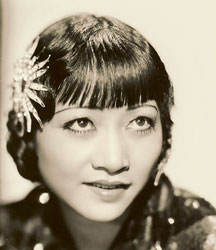ANNA MAY WONG
Chinese-American actor stood up to Hollywood racism
By
Edward Yudelovich
Published Mar 9, 2012 9:07 PM
The U.S. motion picture industry has a record of advocacy of imperialist wars, racism, sexism and all forms of bigotry. This was the obstacle course through which Anna May Wong — star of more than 50 films and the first Chinese-American star of her own TV show — had to navigate.
Wong’s career was obstructed by racist laws prohibiting her from sharing an on-screen kiss with any person of another race — even if the character was Asian but being portrayed by a white actor. Tired of being both typecast and passed over for lead Asian character roles in favor of non-Asian actors, Wong left Hollywood in 1928 for Europe.
Interviewed by Doris Mackie for Film Weekly in 1933, Wong stated: “I was so tired of the parts I had to play. There seems little for me in Hollywood, because, rather than real Chinese, producers prefer Hungarians, Mexicans, American Indians for Chinese roles.”
Just as the great African-American entertainer and Civil Rights activist Josephine Baker received greater respect for her art when she left the racist U.S. for Europe, Wong became a sensation, starring in such notable films as “Schmutziges Geld” (“Song and Show Life,” 1928) and “Großstadtschmetterling” (“City Butterfly”).
Wong began using her newfound celebrity to make political statements, including harsh criticism of the 1931 Mukden Incident and Japanese imperialism’s subsequent invasion of Manchuria. She also became outspoken in her advocacy for Chinese-American causes and for better film roles. In a 1933 interview for Film Weekly entitled “I Protest,” Wong criticized the negative stereotyping in “Daughter of the Dragon,” “Why is it that the screen Chinese is always the villain? And so crude a villain — murderous, treacherous, a snake in the grass! We are not like that. How could we be, with a civilization that is so many times older than the West?”
Wong returned to the U.S. in June 1935 with the goal of obtaining the role of O-lan, the lead female character in MGM’s film version of Pearl Buck’s novel, “The Good Earth.” Instead Wong was offered the part of Lotus, a character described as being deceitful because she helped to destroy the family. Wong refused the role because of the unsympathetic character she was asked to play.
Despite the fact that Buck had intended the film to be cast with all Chinese or Chinese-American actors, producer Irving Thalberg’s assistant, Albert Lewin, after testing Anna May and other Chinese actors, argued that despite their ethnicity, they did not fit “his” conception of what Chinese people looked like. Instead he selected German actress Luise Rainer for the role of O-lan, for which she won her second consecutive Academy Award.
In the 84-year history of the Academy, no female Chinese American or woman of Chinese descent has ever won the Oscar in the best actress or best supporting actress categories.
In 2007, Asian-American filmmaker Elaine Mae Woo paid tribute to Wong’s legacy and perseverance with the acclaimed documentary “Anna May Wong: Frosted Yellow Willows, Her Life, Times and Legend.” (“Frosted Yellow Willows” is Wong’s birth name in English.)
Articles copyright 1995-2012 Workers World.
Verbatim copying and distribution of this entire article is permitted in any medium without royalty provided this notice is preserved.
Workers World, 55 W. 17 St., NY, NY 10011
Email:
[email protected]
Subscribe
[email protected]
Support independent news
DONATE


